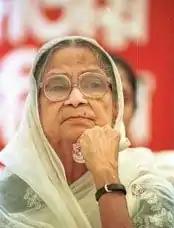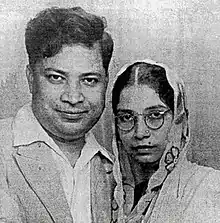Sufia Kamal
Begum Sufia Kamal (20 June 1911 – 20 November 1999) was a Bangladeshi poet and political activist.[3] She took part in the Bengali nationalist movement of the 1950s and civil society leader in independent Bangladesh. She died in 1999 and was the first woman to be given a state funeral in Bangladesh.[4][5][6]
Begum Sufia Kamal | |
|---|---|
সুফিয়া কামাল | |
 | |
| Born | 20 June 1911[1][2] Barisal, Eastern Bengal and Assam, British India |
| Died | 20 November 1999 (aged 88) Dhaka, Bangladesh |
| Occupation | poet, writer |
| Spouse(s) | Syed Nehal Hossain
(m. 1922; died 1932)Kamaluddin Ahmed
(m. 1937; died 1977) |
| Children | Sultana Kamal (daughter) |
| Awards | full list |
Early life

Kamal was born in Shaestabad, Barisal. During her childhood, women's education was prohibited and she could not afford to get academic education. Nevertheless, she learned Bengali, Hindi, Urdu and Arabic languages at home education. In 1918, she went to Kolkata with her mother where she came to meet with Begum Rokeya.[7] She was first married at the age of 11 to her cousin Syed Nehal Hossain who was a law student. They had a daughter, Amena Kahar. Hossain died in 1932. Five years later, Sufia married Kamaluddin Ahmed.[4][8]
Kamal later had two other daughters, Sultana Kamal and Saida Kamal, and two sons Shahed Kamal and Sajed Kamal.
In 1925, Kamal met Mahatma Gandhi, which inspired her to wear simple clothing.[3] Kamal's first poem, Bashanti (Of Spring), was published in Saogat magazine in 1926. In 1931 she became the first Bengali Muslim female to be a member of the Indian Women Federation.[7]
Literature
A short story Shainik Bodhu which Kamal wrote was published in a local paper in 1923.[7] In 1937, she published her first collection of short stories, Keyar Kanta (Thorns of the Keya Tree). Her literary career took off after her first poetry publication. Her first book of poems, Sanjher Maya (Evening Enchantment), came out in 1938, bearing a foreword from Kazi Nazrul Islam and attracting praise from Rabindranath Tagore.[9]
Activism
In 1947, Kamal became the inaugural editor of the Begum weekly magazine specialized on women's issues which was published by Mohammad Nasiruddin. In October of that year after the partition of India she came to Dhaka. During a huge clash between Hindu and Muslim of that time Kamal worked for their friendship and joined in Peace Committee. In 1948, when Purbo Pakistan Mohila Committee formed, she became its chairman.[7] Kamal's activism continued in 1952, with the Language Movement. In 1961, when the Pakistani government banned Rabindra Sangeet (Songs of Rabindranath), she became involved in the movement among Bengalis that ensued in 1961. During the mass uprising in 1969, which demanded the resignation of Pakistani military general Ayub Khan, she promoted the cause by forming Mohila Sangram Parishad (Women's Struggle Group).
In later life, she made women's rights her top priority and headed Bangladesh's largest women's organisation, Mahila Parishad, for many years. She did not see the oppression of women as mainly a class issue. She was also the first Chairperson of BRAC (1972–1980).
Kamal was instrumental in getting the first women's dormitory of Dhaka University to be named Rokeya Hall, after Begum Rokeya.
Role in liberation war
Kamal showed her bravery several times. Once Ayub Khan at a meeting with social elites of Dhaka, commented that ordinary people are like beasts and as such, not fit to be given franchise. Sufia Kamal at once stood up and remarked, "If the people are beasts then as the President of the Republic, you are the king of the beasts."[10]
When the news of the 'killings' of Kamal and Dr Nilima Ibrahim by Pak Army after the crack down on 25 March 1971 was broadcast on Akashbani, a radio station of the Indian state West Bengal, it drew criticism internationally and countries across the world put diplomatic pressure on the then Pakistani military government for clarification. The Pakistani government was forced to broadcast an interview with the poet on radio only to prove that Sufia Kamal was still alive.[11]
Zillur Rahman, the then regional director of Radio East Pakistan, forwarded a paper to Kamal to sign with the statement "In 1971 no massacre took place in Bangladesh." When she refused, Rahman threatened, "If you don't give your signature then it might create a problem both for you and your son-in-law Kahar Chowdhury." She told him that she didn't care for her life. She said, "I would rather die than put my signature on the false statement."[11]
She actively but secretly helped freedom fighters of the Liberation War. In 1971, several people in Dhaka including professor Ghyasuddin Ahmed and writer Shahidullah Kaiser collected medicine and food and delivered those to the posts of Sufia Kamal's house, from where the freedom fighters picked those up for their training outpost.[12] From July 1971, she used to go to the hospital with food and medicine for the injured people of war. At that time there was an acute crisis of food and medicine in the hospital. She used to give food and medicine to certain rickshaw pullers at the Science Laboratory, Dhaka. They would take the food and medicine to the freedom fighters. She was able to establish closer contact with the freedom fighters such as Abul Barak Alvi, Shafi Imam Rumi, Masud Sadek Chullu and Jewel in August. As the Pakistani army kept their strong watch on her, she would try to help the freedom fighters in different ways ignoring the risks. Except Abul Barak Alvi, all others died in the hand of the Pakistani Army.[11] The Pakistan Army and their collaborators killed Sufia Kamal's son-in-law, Kahar Chowdhury, because they were very angry with her. Early December 1971 Shahidullah Kaiser, Munier Chowdhury and Fazle Rabbi cautioned her to leave Dhaka but they themselves did not leave and got caught and later got killed.[11]
Awards
- Bangla Academy Literary Award for Literature (1962)
- Lenin Centenary Jubilee Medal (1970) from the Soviet Union
- Ekushey Padak (1976)
- Czechoslovakia Medal (1986)
- Jatyo Kabita Parishad Award (1995)
- Begum Rokeya Medal (1996)
- Deshbandhu CR Das Gold Medal (1996)
- Independence Day Award (1997)
Works
- Mrittikar Ghran (The Fragrance of Earth)
- Ekatturer Diary (Diary of '71)
- Benibinyas Samay To Ar Nei (No More Time for Braiding Your Hair)
- Ekale Amader Kal (In This Time, Our Time)
Recognition
The National Public Library in Dhaka is named the Sufia Kamal National Public Library in her honour.[13] On June 20, 2019, Google celebrated her 108th birthday with a Google Doodle.[14]
References
- "Google celebrates Sufia Kamal's 108th birthday with Doodle". prothomalo.com. Retrieved 20 June 2019.
- "Google Doodle celebrates 108th birth anniversary of poet Sufia Kamal". dhakatribune.com. 20 June 2019. Retrieved 20 June 2019.
- Kabir, Ahmad (2012). "Kamal, Begum Sufia". In Islam, Sirajul; Jamal, Ahmed A. (eds.). Banglapedia: National Encyclopedia of Bangladesh (Second ed.). Asiatic Society of Bangladesh.
- Douglas Martin (28 November 1999). "Sufia Kamal, Poet and Advocate, Dies at 88". The New York Times. Retrieved 21 November 2012.
- "Google Doodle celebrates 108th birth anniversary of poet Sufia Kamal". Newsd www.newsd.in. Retrieved 20 June 2019.
- "Begum Sufia Kamal, as I knew her". thedailystar.net. Retrieved 20 June 2019.
- Prothom Alo, 20 November 2006
- "Kamaludddin Ahmed Khan: Keen, unconventional, relevant". The Daily Star. 10 May 2018. Retrieved 8 December 2018.
- "সাহিত্যে কবি সুফিয়া কামাল". dailysangram.com. Retrieved 20 June 2019.
- Hoque, Mofidul (July 2012). "Sufia Kamal : Her Journey Towards Freedom". The Daily Star. Retrieved 2 January 2014.
- Hussain, Akbar (16 December 2004). "I would rather die than sign any false statement". The Daily Star. Retrieved 2 January 2014.
- Akhtar, Shameem (14 December 2013). "A tribute to our martyred intellectuals". The Daily Star. Retrieved 31 December 2013.
- "Central Public Library renamed". The Daily Star. 22 January 2010. Retrieved 28 December 2018.
- "Sufia Kamal's 108th Birthday". Google. 20 June 2019.